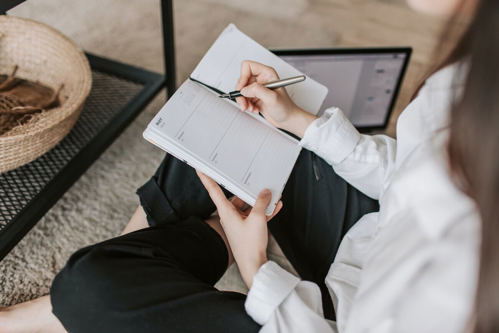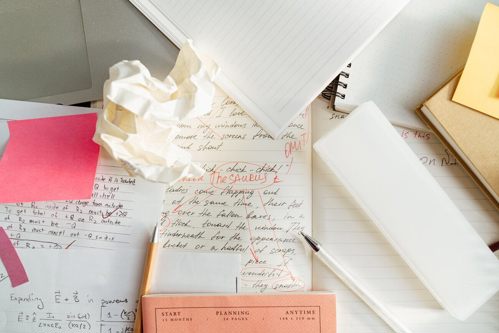Throughout the years, it’s likely you’ve developed some questionable study habits - we all have! While some may be beneficial and help us to focus, others tend to be counterproductive and probably more of a comfort rather than something that helps us along.
Research says it takes an average of 66 days to form a new habit, and an even shorter 21-30 days to break one, so if you’re about to embark on a learning journey and keen to break some of your poor study habits, then this is the blog for you.

Poor Study Habit #1: Studying without a plan
Having a solid study plan or outline is extremely beneficial when it comes to getting the most out of your study sessions. For many of us, we’re studying alongside full-time work and busy home lives, which means the time we do have to dedicate to our studies is slim.
A positive way to make the most of this time, however, is by creating a study calendar. We recommend:
- Listing your subjects or modules: once your subjects are listed, you will be able to easily identify what work and assessments need completed for each.
- Planning how long modules will take: look at your assessments for each module and plan how long you think each take. This then means you know how many study sessions you need.
- Developing your schedule: put each task into a certain time block, e.g., between 8:30-9:30pm. This will help you focus at that time on that task.
- Thinking about your learning style: once you have your tasks planned out, analyse how you best learn, whether that be visually, through reading and writing or through listening. This will then allow you to make study materials that best suit you and how you absorb information.

Poor Study Habit #2: Getting easily distracted
Distractions can come in all different forms and most of time, it can be subconscious.
Although sometimes uncontrollable, what you can control is your study space and how busy your surroundings are. Some people are more easily distracted than others and if you’re one of these people, it’s possible to make things easier for yourself by:
- Preparing your space before studying: whether this be a comfortable chair, your notes, a bottle of water or a snack. If you are without these things, you’re likely to keep getting up when you want something, making it easier to get distracted.
- Turning off your phone: research says that people spend around 44% of their waking hours looking at their phone screens, making your phone one of your biggest distractions! Put it away in a drawer if you can.
- Time blocking: like we mentioned earlier, if you set a specific amount of time to do a task in and you know that the task needs to be done in that allocated slot, you’re much less likely to get distracted. For those who are really easily distracted, we recommend The Pomodoro Technique, short bursts of 25 minutes.

Poor Study Habit #3: Cramming
We’ve all been a victim of leaving assignments until the last minute or staying up all night to study before an exam. With cramming proven to actually increase stress levels, we recommend nipping this habit in the bud and trying a few of the below instead:
- Writing the introduction straight away: this reduces the feelings of overwhelm that come with starting a big task and makes it easier to work over several weeks.
- Starting your assignments early: if you know you have a piece of work due at the end of the month, start it at least 2 weeks in advance! Even if you don’t finish it until the last minute, your assignment is likely to be of much better quality if you give yourself a bit more time.
- Distracting yourself the night before deadlines: Keeping yourself busy (within reason) the night before an exam is a good way to prevent any last minute cramming.

Poor Study Habit #4: Sticking to standard studying techniques
Everyone learns differently and when we start studying in a way that works for us, it becomes a lot easier. Identifying the ways in which you learn best, whether that be as an auditory learner, kinaesthetic learner, visual learner or by reading and writing is the first step.
Following this, you can then mix up your studying techniques and you’ll probably find you are able to absorb information much easier. Some strategies we suggest are:
- Recording blocks of text and listening back to them
- Making flashcards and having someone else quiz you
- Drawing images, diagrams and maps on paper
- Practise demonstrations, relating your tasks to real-life situations
- Creating acronyms, short stories or brain teasers with your study material
- Reading notes out loud, whether that be while studying, out and about or doing housework

Poor Study Habit #5: Forgetting to take regular breaks
Taking breaks is great for refocusing, improving energy levels and increasing productivity. We know that for some people, however, breaks can be counterproductive due to the fear of getting distracted, procrastination or demotivation.
If this applies to you, a few things you could try are to:
- Time your break: find a number that works for you and stick to it. This will help you feel in control and reduce the fear of getting distracted and not returning to your study session.
- Think of a break not as an if, but as a when and for how long: shifting your thoughts and trying a change of perspective might be more beneficial than you think. Tell yourself that you must take a break, no matter when it is or how long it is.
- Schedule breaks: if your breaks are included in your study planner, they’ll soon become part of your routine and something you look forward to
- Plan something to do on your breaks: having something to look forward to, like making a cup of tea, or phoning a friend for 10 minutes will help you associate taking a break with something positive.

Poor Study Habit #6: Not having a calm, comfortable place to study
Your study space is a vital part of any successful study session and everyone needs somewhere they feel comfortable, relaxed and motivated to learn. Take some time to perfect your environment, including a couple of items that bring you joy. These changes don’t need to be big or expensive, we recommend:
- A storage box or tray to keep your study material organised
- A desk plant or some kind of greenery
- A supportive chair to reduce slouching or feeling uncomfortable
- Natural lighting or a desk lamp to make sure you don’t strain your eyes
If you feel like any of these poor study habits resonate with you, don’t worry, as it’s never too late to turn it around! We hope these tips and tricks help you combat any negative connotations you may have around studying, which in turn will set you up for many a successful study session.
Put your new study habits to good use and gain a professional qualification with DPG today.






